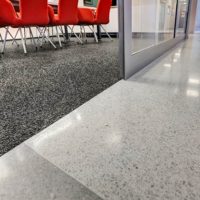The floor is probably one of the most affected areas of a building since it takes the brunt of all the foot traffic of people and equipment that enter the building. It is customary for home and building owners to wish for floors that are aesthetically pleasing and elegant-looking. However, there are times when flooring materials such as hardwood and marble floors will not be suitable flooring materials, especially if they have heavy foot and equipment traffic such as warehouse and commercial buildings. For these types of buildings, it is best to install resin flooring.
What is Resin Flooring?
Resin or epoxy flooring are commonly used for areas that have heavy traffic such as a commercial establishment or a factory. Resin coatings are applied over concrete floors to create a more durable, smoother, and high-performance surface that can last for generations.
How are Resin Flooring Installed?
A resin flooring is not installed rather epoxy or resin is poured over a semi-porous surface such as concrete or hardwood floors. However, the concrete or hardwood must be unsealed or unpolished for the epoxy to properly bond. You can test if your floor has already been polished or sealed by dropping small amounts of water on the floor. If the water forms beads on the surface and does not seep through, the floor is already sealed and polished. You can recoat floors that have already been previously coated with resin if it has lost its sheen or have extensive damages.
What are the Benefits of Resin Flooring?
Epoxy flooring creates an impermeable and durable surface that is harder than the underlying concrete or hardwood. Likewise, resin floors will give you these benefits.
Extremely Tough and Durable. Epoxy flooring is created when two chemicals are mixed to create a bonding agent. This mixture is then applied to cover the original flooring. When the mixture dries and cures, it creates a surface that is stronger than the underlying floor.
Flexible. Aside from being tough and durable, the resin layer is also flexible and tensile, which means that it can hold large amounts of weight without breaking. Likewise, because it is flexible, the resin layer will also act as a shock absorber that will lessen the impact of the underlying floors.
Scratch Resistant. Resin flooring is also resistant to being scratched when heavy objects are dragged on the floor.
Aesthetically Pleasing. The layer of resin will also give your original floor added sheen and lustre. Likewise, if your underlying floor is made of quality hardwood, you can retain the hardwood floor’s look by applying a coat of transparent resin.
Cost-Effective. Floors that are coated with resin will not require heavy cleaning and maintenance. Since resins are waterproof, they will protect your floors against staining and water damages. You can also clean your resin floors using water and other chemicals since resin floors are also resistant to being damaged by chemical cleaning solutions. Moreover, resin floors are a cheaper alternative to flooring materials such as marble and tiles. You can even have resin flooring specialists create a floor that will look similar to marble with a faux white marble epoxy coating.
Safe. Although resin floors have a sheen, epoxy flooring is not slippery, unlike marble floors. This anti-slip property makes resin flooring safer than marble and other shiny floorings.
Resin flooring is a cheaper, safer, and more durable flooring alternative than marble and will give you a long-lasting quality floor.

